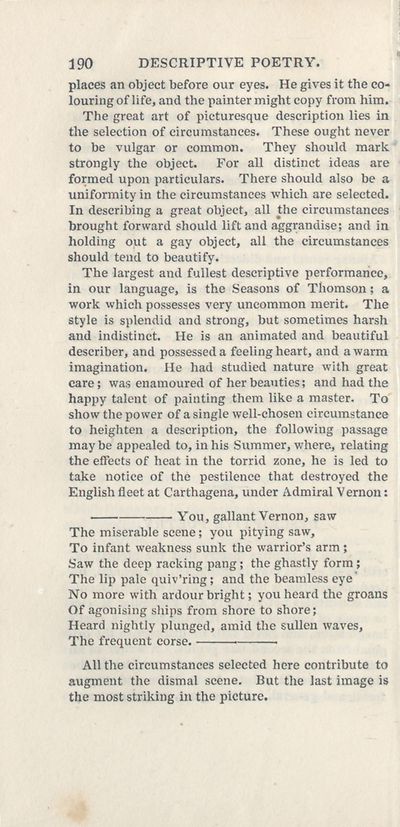Education > Essays on rhetoric
(218)
Download files
Complete book:
Individual page:
Thumbnail gallery: Grid view | List view

DESCRIPTIVE POETRY.
190
places an object before our eyes. He gives it the co¬
louring of life, and the painter might copy from him.
The great art of picturesque description lies in
the selection of circumstances. These ought never
to be vulgar or common. They should mark
strongly the object. For all distinct ideas are
formed upon particulars. There should also be a
uniformity in the circumstances which are selected.
In describing a great object, all the circumstances
brought forward should lift and aggrandise; and in
holding out a gay object, all the circumstances
should tend to beautify.
The largest and fullest descriptive performance,
in our language, is the Seasons of Thomson; a
work which possesses very uncommon merit. The
style is splendid and strong, but sometimes harsh
and indistinct. He is an animated and beautiful
describer, and possessed a feeling heart, and a warm
imagination. He had studied nature with great
care; was enamoured of her beauties; and had the
happy talent of painting them like a master. To
show the power of a single well-chosen circumstance
to heighten a description, the following passage
may be appealed to, in his Summer, where, relating
the effects of heat in the torrid zone, he is led to
take notice of the pestilence that destroyed the
English fleet at Carthagena, under Admiral Vernon;
You, gallant Vernon, saw
The miserable scene; you pitying saw.
To infant weakness sunk the warrior’s arm;
Saw the deep racking pang ; the ghastly form ;
The lip pale quiv’ring; and the beamless eye
No more with ardour bright; you heard the groans
Of agonising ships from shore to shore;
Heard nightly plunged, amid the sullen waves,
The frequent corse.
All the circumstances selected here contribute to
augment the dismal scene. But the last image is
the most striking in the picture.
190
places an object before our eyes. He gives it the co¬
louring of life, and the painter might copy from him.
The great art of picturesque description lies in
the selection of circumstances. These ought never
to be vulgar or common. They should mark
strongly the object. For all distinct ideas are
formed upon particulars. There should also be a
uniformity in the circumstances which are selected.
In describing a great object, all the circumstances
brought forward should lift and aggrandise; and in
holding out a gay object, all the circumstances
should tend to beautify.
The largest and fullest descriptive performance,
in our language, is the Seasons of Thomson; a
work which possesses very uncommon merit. The
style is splendid and strong, but sometimes harsh
and indistinct. He is an animated and beautiful
describer, and possessed a feeling heart, and a warm
imagination. He had studied nature with great
care; was enamoured of her beauties; and had the
happy talent of painting them like a master. To
show the power of a single well-chosen circumstance
to heighten a description, the following passage
may be appealed to, in his Summer, where, relating
the effects of heat in the torrid zone, he is led to
take notice of the pestilence that destroyed the
English fleet at Carthagena, under Admiral Vernon;
You, gallant Vernon, saw
The miserable scene; you pitying saw.
To infant weakness sunk the warrior’s arm;
Saw the deep racking pang ; the ghastly form ;
The lip pale quiv’ring; and the beamless eye
No more with ardour bright; you heard the groans
Of agonising ships from shore to shore;
Heard nightly plunged, amid the sullen waves,
The frequent corse.
All the circumstances selected here contribute to
augment the dismal scene. But the last image is
the most striking in the picture.
Set display mode to:
![]() Universal Viewer |
Universal Viewer | ![]() Mirador |
Large image | Transcription
Mirador |
Large image | Transcription
| Antiquarian books of Scotland > Education > Essays on rhetoric > (218) |
|---|
| Permanent URL | https://digital.nls.uk/113762108 |
|---|
| Description | Thousands of printed books from the Antiquarian Books of Scotland collection which dates from 1641 to the 1980s. The collection consists of 14,800 books which were published in Scotland or have a Scottish connection, e.g. through the author, printer or owner. Subjects covered include sport, education, diseases, adventure, occupations, Jacobites, politics and religion. Among the 29 languages represented are English, Gaelic, Italian, French, Russian and Swedish. |
|---|

